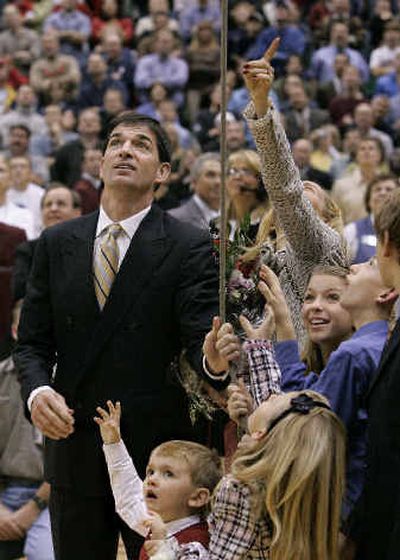He’ll hang around forever

SALT LAKE CITY, Utah – John Stockton walked into a pregame press conference at the Delta Center Monday night wearing an expensive-looking dark suit.
Former Gonzaga University men’s basketball coach Dan Fitzgerald noticed.
“John has bought a mortuary in Spokane,” Fitzgerald told reporters. “That’s why he’s dressed like that.”
Actually, Stockton was wearing his Sunday best for a festive occasion, not a funeral. The Jazz retired his jersey at halftime of their game against New Orleans.
Owner Larry Miller joined Stockton’s family members, friends, former coaches and ex- teammates in honoring the Spokane native, whose No. 12 became the sixth in franchise history to be retired.
“On behalf of the franchise and myself, thank you and we love you,” Miller said, fighting back tears.
A videotape tribute of Stockton’s greatest moments tipped off the ceremony. It ended with his game-winning shot in Game 6 of the 1997 Western Conference finals at Houston. The victory put Utah into the NBA Finals for the first time.
The sellout crowd of 19,911, which included U.S. Senator Orrin Hatch and local football legend Merlin Olsen, roared its approval at the now-famous scene of Stockton leaping into the arms of teammates Karl Malone and Jeff Hornacek after the come-from-behind 103-100 victory.
After some brief remarks by former coach Frank Layden, Jazz broadcaster Rod Hundley told Stockton, “Take the mike and thank the people as only you can do.”
Again, the crowd roared.
“When No. 12 goes up there in a few minutes,” Stockton said, “I want you to take some pride in it because you had something to do with it. … You were here every night.”
Six former teammates attended the celebration, including Adrian Dantley, Thurl Bailey, Mark Eaton, Hornacek and Malone. Before the game at the press conference, Stockton and Fitzgerald shared center stage with Miller, Layden, current Jazz coach Jerry Sloan and Stockton’s wife, Nada.
“This is one of the few times in my life I’m stumped about what to say,” Miller said. “… John’s just special. He’s one of a kind. I don’t know what else to say.”
Mentioning last week’s brawl in Detroit, which resulted in the season-long suspension of Indiana’s Ron Artest, Layden said, “John Stockton and what we’re doing tonight is about all the good things in sport.”
According to Layden, Stockton was a perfect role model for thousands of Utah children during his 19-year career: “I wonder how many mothers said, ‘You think John Stockton won’t eat his dinner? You think John Stockton won’t go to mass?’ “
Layden concluded by thanking Stockton “for making us all a little rich. … Oh, I love retirement.”
Sloan, the longest tenured coach in professional sports, claimed Stockton made his job easier.
“If you don’t have someone who steps up and holds his teammates accountable,” he said, “… then you’re just beating your head against a wall” as an NBA coach.
Sloan also praised Stockton’s competitiveness, pointing out he lost one of the Jazz’s most gruelling practice drills to a teammate just “once in (19) years. … That should tell you something about John Stockton.”
His voice creaking with emotion, Sloan turned to Stockton and said, “You’ve meant a great deal to us. … Thank you, John.”
Nada Stockton said her husband “turned out to be the greatest thing that’s happened to me – all that I hoped he would be. … It’s been a great, great career for both of us.”
When it was Stockton’s turn to address the media – a task far down his list of favorite activities when he played – Miller turned to him and said, “this is the moment you’ve been waiting for.”
Stockton smiled and replied, “You’re expecting a statement?”
Remembering what Fitzgerald had said, Stockton said, “With Fitz’s reference to a mortuary and all the nice things people have been saying, I feel like a dead guy. I’m hearing my eulogy in advance.”
Seriously, Stockton suggested he would not have enjoyed his career in another NBA city.
“I couldn’t have played anywhere else,” he said, “… because comfort is part of it. Anywhere else, I would have been swimming upstream.”
Asked if he ever planned on coaching at the high school, collegiate or professional level, Stockton noted he is already working with some of his children’s teams in Spokane.
“I don’t know,” he said. “People think just because you played a long time means you can coach. (But) the one thing I’ve learned coaching younger kids is how much I have to learn. It’s staggering.”
Just like his career.